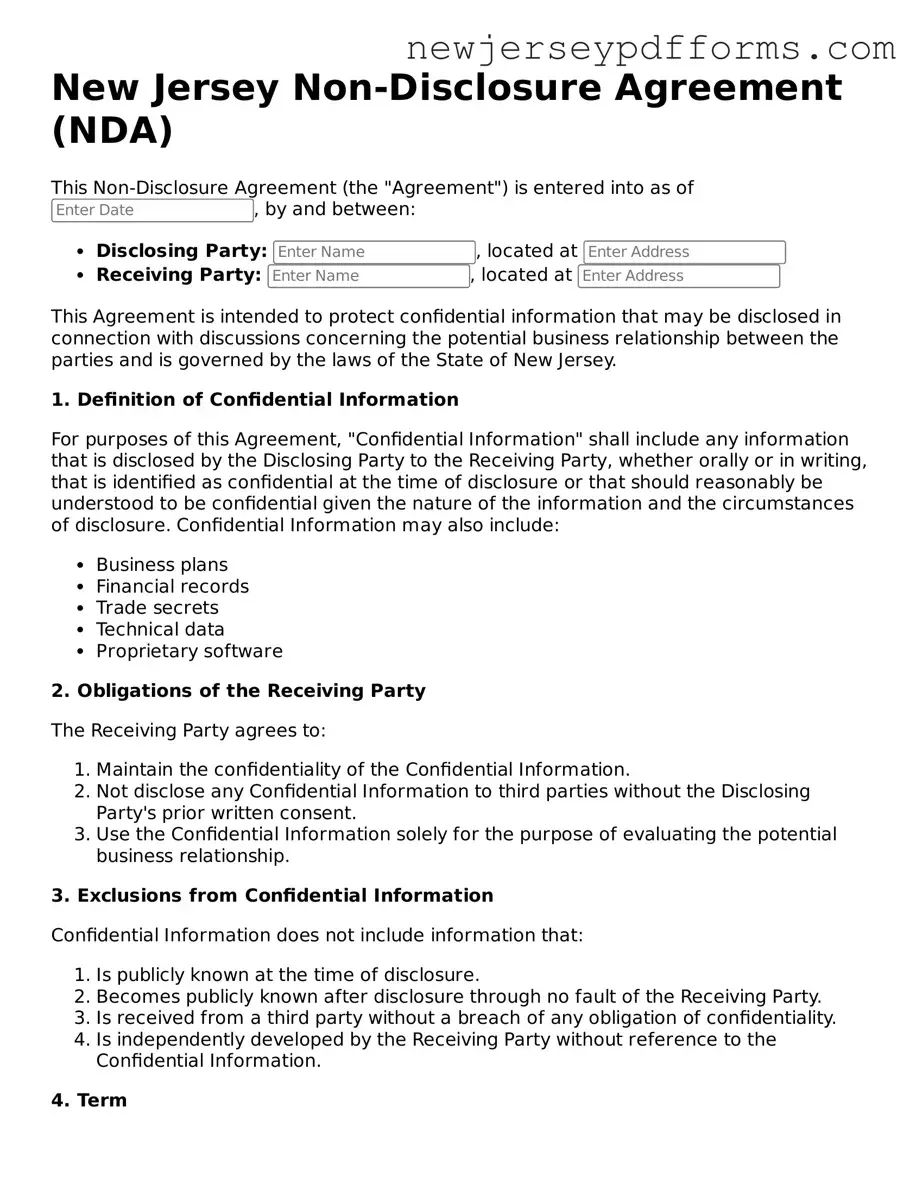A Mutual Non-Disclosure Agreement (MNDA) is similar to the New Jersey Non-Disclosure Agreement in that it protects confidential information shared between two parties. Both agreements ensure that neither party discloses sensitive information to third parties without consent. The MNDA is particularly useful in situations where both parties are exchanging proprietary information, such as during joint ventures or partnerships.
A Confidentiality Agreement serves a similar purpose to the New Jersey Non-Disclosure Agreement by safeguarding private information. While the terms may vary, the core function remains the same: to create a legal obligation for the parties involved to keep shared information confidential. This type of agreement is often used in employment settings to protect trade secrets and sensitive company data.
An Employment Non-Disclosure Agreement is tailored for employees and employers. It is similar to the New Jersey Non-Disclosure Agreement in that it restricts employees from sharing confidential information acquired during their employment. This document is crucial for companies that want to protect their intellectual property and sensitive business strategies from being disclosed to competitors.
A Vendor Non-Disclosure Agreement is often utilized when businesses engage with third-party vendors. Like the New Jersey Non-Disclosure Agreement, it ensures that vendors do not disclose any confidential information they may come across while providing their services. This type of agreement is essential for maintaining trust and protecting sensitive data in vendor relationships.
A Business Partnership Agreement may include non-disclosure clauses that resemble the New Jersey Non-Disclosure Agreement. This document outlines the terms of the partnership while also ensuring that any confidential information shared between partners remains protected. This approach helps build a foundation of trust and cooperation between business partners.
A Licensing Agreement often contains confidentiality provisions similar to those in the New Jersey Non-Disclosure Agreement. When one party licenses intellectual property to another, both parties may need to share sensitive information. The confidentiality clauses in these agreements help protect the interests of both parties and ensure that proprietary information is not misused.
Completing a detailed Horse Bill of Sale document is crucial for anyone involved in horse transactions. This form not only provides a legal record of the sale but also protects both the buyer and seller by documenting essential information pertaining to the horse being sold.
A Sales Agreement can also incorporate non-disclosure terms akin to the New Jersey Non-Disclosure Agreement. When businesses enter into sales transactions, they may need to share sensitive information about pricing, product specifications, or client lists. Including confidentiality provisions in the sales agreement ensures that this information remains protected throughout the transaction.
A Non-Circumvention Agreement often works in conjunction with a Non-Disclosure Agreement. It prevents one party from bypassing the other to engage directly with a third party. Similar to the New Jersey Non-Disclosure Agreement, it protects the interests of both parties by ensuring that confidential information shared during negotiations is not misused.
A Shareholder Agreement may also feature confidentiality clauses similar to those found in the New Jersey Non-Disclosure Agreement. This type of agreement governs the relationship between shareholders and can include provisions to protect sensitive information about the company. By including confidentiality terms, shareholders can safeguard the company's proprietary information from being disclosed to outsiders.
Finally, a Franchise Agreement often includes non-disclosure provisions that align with the New Jersey Non-Disclosure Agreement. Franchisors and franchisees frequently share sensitive business information to ensure the success of the franchise. By incorporating confidentiality clauses, both parties can protect their interests and maintain the integrity of the franchise system.

